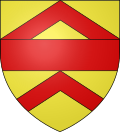| Marshal of the Army of God and the Holy Church | |
|---|---|
 Seal of Robert Fitzwalter, first Marshal of the Army of God and the Holy Church | |
| First Marshal | Robert Fitzwalter |
| Last Marshal | Robert Fitzwalter |
| Appointer | Elective |
| Marshalship began | by 5 May 1215 |
| Date of Marshalship lapsing | 8 December 1235 |
The Marshal of the Army of God and the Holy Church was the title displayed from 1215 by Robert Fitzwalter,[a] the leader of the baronial opposition against John, King of England and one of the twenty-five sureties of Magna Carta.[1] He was feudal baron of Little Dunmow, Essex[2] and constable of Baynard's Castle, in London, to which was annexed the hereditary office of castellain and chief banneret of the City of London. He was elected by his fellow barons, and held the title at least from when the rebels armed themselves in Lincolnshire and formally defied King John. He retained the title at least until he received back the custody of Hertford castle in June. He died on 9 December 1235,[b] and is buried in the Priory Church in Little Dunmow.
Cite error: There are <ref group=lower-alpha> tags or {{efn}} templates on this page, but the references will not show without a {{reflist|group=lower-alpha}} template or {{notelist}} template (see the help page).
- ^ This article incorporates text from a publication now in the public domain: Chisholm, Hugh, ed. (1911). "Fitzwalter, Robert". Encyclopædia Britannica. Vol. 10 (11th ed.). Cambridge University Press. p. 449.
- ^ Sanders, I. J. (1960). English Baronies. Oxford. p. 129.
{{cite book}}: CS1 maint: location missing publisher (link) - ^ Stow, John (1908). "Notes: Volume 1, pp. 1–100". In Kingsford, C. L. (ed.). A Survey of London. Reprinted from the text of 1603. pp. 269–283. Retrieved 23 November 2010.